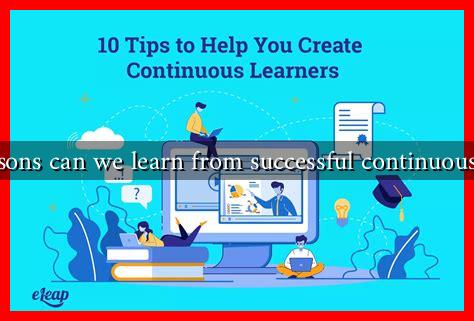-
Table of Contents
What Lessons Can We Learn from Successful Continuous Learners
In an ever-evolving world, the ability to learn continuously is not just an asset; it is a necessity. Successful continuous learners have demonstrated that the pursuit of knowledge is a lifelong journey that can lead to personal and professional growth. This article explores the key lessons we can learn from these individuals, highlighting their strategies, mindsets, and the impact of continuous learning on their lives.
The Mindset of a Continuous Learner
One of the most significant traits of successful continuous learners is their mindset. They embrace a growth mindset, a term popularized by psychologist Carol Dweck. This mindset fosters resilience and a willingness to learn from failures. Here are some characteristics of this mindset:
- Embracing Challenges: Continuous learners view challenges as opportunities to grow rather than obstacles to avoid.
- Persistence: They understand that mastery takes time and effort, and they are willing to put in the work.
- Learning from Criticism: Constructive feedback is seen as a valuable tool for improvement.
- Inspiration from Others: They seek inspiration from the success of others, using it as motivation to pursue their own goals.
For instance, consider the case of Elon Musk, the CEO of SpaceX and Tesla. Musk is known for his voracious reading habits and his ability to learn from various fields, including physics, engineering, and even philosophy. His diverse knowledge base has allowed him to innovate and lead in multiple industries.
Strategies for Continuous Learning
Successful continuous learners employ various strategies to enhance their learning experiences. Here are some effective methods:
- Setting Clear Goals: Defining specific, measurable, achievable, relevant, and time-bound (SMART) goals helps learners stay focused and motivated.
- Utilizing Online Resources: Platforms like Coursera, edX, and Khan Academy offer a wealth of courses that cater to different interests and skill levels.
- Networking and Collaboration: Engaging with peers and mentors can provide new perspectives and insights that enrich the learning process.
- Reflective Practice: Taking time to reflect on what has been learned helps solidify knowledge and identify areas for improvement.
For example, Bill Gates, co-founder of Microsoft, is known for his commitment to lifelong learning. He dedicates time each year to read books across various genres, which he believes broadens his understanding of the world and informs his philanthropic efforts.
The Role of Curiosity
Curiosity is a driving force behind continuous learning. Successful learners possess an innate desire to explore and understand the world around them. This curiosity leads them to ask questions, seek answers, and delve deeper into subjects of interest. Here are some ways curiosity manifests in continuous learners:
- Asking Questions: They are not afraid to ask “why” and “how,” which leads to deeper understanding.
- Exploring New Interests: They are open to exploring topics outside their primary field, which can lead to innovative ideas and solutions.
- Staying Updated: Continuous learners actively seek out new information and trends in their areas of interest.
Take, for instance, the story of Oprah Winfrey. Her curiosity has driven her to explore various subjects, from literature to spirituality, which has not only enriched her own life but also inspired millions through her media platforms.
Conclusion: The Path to Lifelong Learning
In conclusion, the lessons we can learn from successful continuous learners are invaluable. By adopting a growth mindset, employing effective learning strategies, and nurturing curiosity, we can enhance our own learning journeys. The world is full of knowledge waiting to be discovered, and by committing to lifelong learning, we can unlock our potential and adapt to the ever-changing landscape of life and work.
As we move forward, let us remember that the pursuit of knowledge is not a destination but a continuous journey. Embrace the lessons from those who have walked this path before us, and let their experiences guide us toward a brighter, more informed future.
For more insights on continuous learning, consider exploring resources from edX or Coursera.

